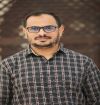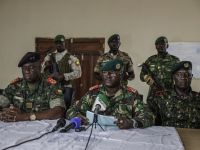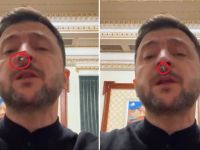The United States said Israel and the Palestinians had to share responsibility for ending a cycle of violence and pledged to help bring about a Palestinian state through political means within three years.
Saudi Foreign Minister Prince Saud al-Faisal, joined by his counterparts Marwan Moasher of Jordan and Ahmed Maher of Egypt, briefed the president on a plan in the works for statehood that prescribes a ceasefire followed by an Israeli pull out, which would allow for Palestinian elections and for a Palestinian state to be formed over the next three years.
"We talked more on these details with the secretary (Powell) but we mentioned the main elements to the president and he was very pleased with it," Prince Saud said.
Al-Faisal added all Palestinian factions, including Hamas and Islamic Jihad, were working on a cease-fire in their conflict with Israelis. "They are all working on a paper that has all the conditions that they will subscribe to for stopping the fighting," he said, with little elaboration.
Prince Bandar bin Sultan, the Saudi ambassador to Washington, who attended the meeting with Bush, emphasized also that Palestinian groups were already in talks for a written cease-fire agreement. "The Palestinians themselves are right now sitting and negotiating together and between them, and rationalizing, 'Hey, do we want a state or not?'," Prince Bandar said.
"For the first time the Palestinian people will have a say in what their future is," Prince Saud said, and "all the parties -- whether Hamas, al Jihad, Fatah, everybody else --if they want to be elected then they must follow the wishes of the people."
Bush agreed to influence Israel to withdraw its troops from the Palestinian-controlled areas once Palestinians agree to a cease-fire, al-Faisal stated. "In all fairness to the president, we didn't ask him to use his influence with Israel. He volunteered to do that," al-Faisal aired.
He told reporters after the Oval Office meeting that ministers were happy Bush said peace would only come if all sides took their responsibilities seriously. "Our vision for peace understands that all parties have got responsibilities. The United States has a responsibility...
The Israelis have a responsibility. The Palestinians have a responsibility," Bush told reporters ahead of the meeting.
Briefing reporters after the talks, Prince Saud blamed Israeli Prime Minister Ariel Sharon for holding up Middle East peace and said he would be more optimistic for peace if he were "not there." "It must change by the Israelis themselves, those who want peace...If they leave it to Sharon, he will lead the Middle East only to tragedy and conflict," he said.
Bush refused to let the increased violence shatter his vision for regional peace. "I think the enemies against peace try to derail peace and try to discourage us," Bush said immediately ahead of the meeting. "And one of the things I'm going to tell the leaders today is we refuse to be discouraged."
Also speaking to reporters after the meeting with Bush, Egyptian Foreign Minister Ahmed Maher said the U.S. leader reaffirmed his determination to help Israelis and the Palestinians to settle their conflict. "We came out very encouraged, upbeat from our meeting," the Egyptian diplomat said.
Maher said that Yasser Arafat's future role was not a main topic of the Bush meeting. "We both believe in democracy and we both believe that it is up to the Palestinian people to chose and elect their leaders," Maher said. (Albawaba.com)
© 2002 Al Bawaba (www.albawaba.com)









